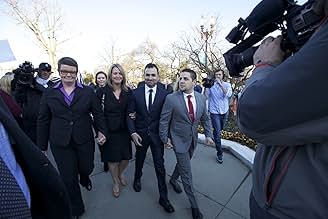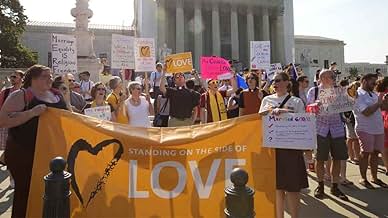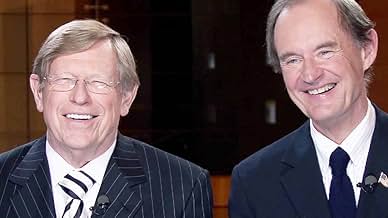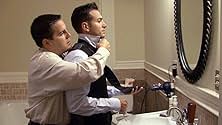NOTE IMDb
7,4/10
1,2 k
MA NOTE
Ajouter une intrigue dans votre langueA behind-the-scenes look inside the case to overturn California's ban on same-sex marriage. Shot over five years, the film follows the unlikely team that took the first federal marriage equa... Tout lireA behind-the-scenes look inside the case to overturn California's ban on same-sex marriage. Shot over five years, the film follows the unlikely team that took the first federal marriage equality lawsuit to the U.S. Supreme Court.A behind-the-scenes look inside the case to overturn California's ban on same-sex marriage. Shot over five years, the film follows the unlikely team that took the first federal marriage equality lawsuit to the U.S. Supreme Court.
- Réalisation
- Scénario
- Casting principal
- Nommé pour 2 Primetime Emmys
- 11 victoires et 18 nominations au total
Christopher D. Dusseault
- Self
- (as Chris Dusseault)
Jeffrey J. Zarrillo
- Self
- (as Jeff Zarrillo)
Paul T. Katami
- Self
- (as Paul Katami)
Kristin M. Perry
- Self
- (as Kris Perry)
Sandra B. Stier
- Self
- (as Sandy Stier)
Elliott Perry
- Self
- (as Elliot Perry)
Avis à la une
The "8" in the title refers to Proposition 8, a California referendum in 2008 that overturned that state's legislation to allow same-sex couples to marry. This documentary covers a five-year period in which two same-sex couples (one male, one female) work with a team of lawyers to fight for the restoration of equal marriage.
Even though the end result is already known, this film has a very powerful effect mainly because of the people involved. Most shocking is that a devout Republican attorney, Ted Olson, is part of the team to fight for equal marriage. One of his colleagues in the battle is David Boies who had fought against Olson in the 2000 U.S. presidential election case on whether the Florida votes should be counted. This is an odd but intriguing pairing, indeed.
While the legal storyline is fascinating, the main force of this film is intimate portraits of the two couples who are the plaintiffs in the case: Kris Perry, Sandy Steier, Jeff Zarrillo, and Paul Katami. The revelations of their lives, their coming-out stories, and the support of their families hits right at the emotional core. These are four fascinating people.
"The Case Against 8" begins with high emotions but it flattens a bit somewhere during the second half. However, the personal victories that are exposed in the end leave such a rise in the heart that this movie must be credited for its inspiration in showing the very best of the collective human spirit. This is truly a case where the personal is political and it is magnificent.
Even though the end result is already known, this film has a very powerful effect mainly because of the people involved. Most shocking is that a devout Republican attorney, Ted Olson, is part of the team to fight for equal marriage. One of his colleagues in the battle is David Boies who had fought against Olson in the 2000 U.S. presidential election case on whether the Florida votes should be counted. This is an odd but intriguing pairing, indeed.
While the legal storyline is fascinating, the main force of this film is intimate portraits of the two couples who are the plaintiffs in the case: Kris Perry, Sandy Steier, Jeff Zarrillo, and Paul Katami. The revelations of their lives, their coming-out stories, and the support of their families hits right at the emotional core. These are four fascinating people.
"The Case Against 8" begins with high emotions but it flattens a bit somewhere during the second half. However, the personal victories that are exposed in the end leave such a rise in the heart that this movie must be credited for its inspiration in showing the very best of the collective human spirit. This is truly a case where the personal is political and it is magnificent.
10phxguy
Let's leave it at that. Allowing us to witness the personal struggle of these four Americans to gain basic Constitutional protection, and the efforts of so many to help them and to bring about the final outcome of this case as presented in the film is truly moving. As per the title, it wasn't supposed to be anything other than presenting the case AGAINST Proposition 8. If some are left wondering where the arguments were for the proponents of the proposition, the film detailed how the witnesses for the proposition, one by one, fell away leaving only one witness, who in the course of cross-examining came to realize that he actually was siding with the plaintiffs. The Supreme Court reached the verdict that there wasn't any any compelling argument, that there was no standing to appeal against the Supreme Court's ruling, because their rights were not harmed by striking down the proposition. As was referenced in other reviews, people seem to miss the point of the case (and the film): the populace and local legislatures may not pass local laws that violate the US Constitution. There was no other side because there was no other side, other an animus, and hate is not an American value.
This one of the better films on civil liberties. We were all fortunate enough for important court case to occur before a majority of Californians changed their views.
Why do I say that? Because marriage equality just like any other civil liberty or right should never have been decided on popular views. These rights ough to be regarded as absolute with no amount of local interference acceptable no matter how the wind blows. Rather than this bounce around on popular opinion, we were able to have a ruling based on the Constitution.
I am glad the film features, and in fact centers on Ted Olson, who unlike so may arguing from point of view and interest, argued for constitutional consistency (just as he had done with the Florida recount and ending clearly unconistutional local gun bans). Some of the commenters and professing reviewers express surprise at "irony" of Olson's and Gibson Dunn's positon. The irony is only a perceived one of reviewers who don't understand the libertarian leaning position.
Why do I say that? Because marriage equality just like any other civil liberty or right should never have been decided on popular views. These rights ough to be regarded as absolute with no amount of local interference acceptable no matter how the wind blows. Rather than this bounce around on popular opinion, we were able to have a ruling based on the Constitution.
I am glad the film features, and in fact centers on Ted Olson, who unlike so may arguing from point of view and interest, argued for constitutional consistency (just as he had done with the Florida recount and ending clearly unconistutional local gun bans). Some of the commenters and professing reviewers express surprise at "irony" of Olson's and Gibson Dunn's positon. The irony is only a perceived one of reviewers who don't understand the libertarian leaning position.
As a non-American, I found this a compelling look at one of the quirkier aspects of US law and politics - how states may hold local referenda (at least California seems to do it a lot) that may then be challenged in the Supreme Court.
An intriguing aspect was the employment in support of the case of Ted Olsen, the Republican lawyer who got George W Bush elected by making Florida stop its decisive recount. The LGBT community was initially suspicious of him, but he won them over by his principled stand.
Reviewers who want to re-litigate the case itself seem to have missed the point. The populace and local legislatures may not pass local laws that violate the US Constitution. Proposition 8 was ruled to breach the 14th Amendment, guaranteeing equality to all citizens. Its supporters did not have standing to appeal against the Supreme Court's ruling, because their rights were not harmed by striking down Prop 8.
This was not intended to be "balanced", as its title implies. As a real documentary it followed real people through an unpredictable course of events. It might have all ended in tears. It would have then been useful as a fundraiser to continue the fight.
An intriguing aspect was the employment in support of the case of Ted Olsen, the Republican lawyer who got George W Bush elected by making Florida stop its decisive recount. The LGBT community was initially suspicious of him, but he won them over by his principled stand.
Reviewers who want to re-litigate the case itself seem to have missed the point. The populace and local legislatures may not pass local laws that violate the US Constitution. Proposition 8 was ruled to breach the 14th Amendment, guaranteeing equality to all citizens. Its supporters did not have standing to appeal against the Supreme Court's ruling, because their rights were not harmed by striking down Prop 8.
This was not intended to be "balanced", as its title implies. As a real documentary it followed real people through an unpredictable course of events. It might have all ended in tears. It would have then been useful as a fundraiser to continue the fight.
The Case Against 8 was very well-received at its showing at Austin's SXSW Film Festival. This film presents a powerful human portrait of the individuals involved in fighting the legal case that led to the successful legal case that legalized same-sex marriage in CA. The film provides a detailed step-by-step examination of the case and provides considerable human insight into both the unusual legal team that fought the case and the lead plaintiffs who undertook the case. The film brings their heroic struggle to life. It also provides an excellent example of how to present a legal documentary for a non-expert audience with equal parts law and humanity.
However, like so many political documentaries the film is one- sided in its presentation. It sometimes mocks the other side's arguments so that one wonders how they were not laughed out of court. Although some of their adversary's views are presented, it does not really allow an articulate presentation of the other side's case. The film does not really give any screen time to advocates for Proposition 8. Nor does it seem to take seriously the argument that Proposition 8 was supported by a majority of the state's population in a popular vote. In this sense, the film seems to cross the foggy line between documentary film making and political advocacy film making. While I agree with the filmmakers in their opposition to Proposition 8, I don't believe they present an objective multi-dimensional picture of a complex and controversial issue. I wish they had found a way to present a fairer and more complete picture of both sides in what still remains a hotly contested issue. Despite these flaws, the film still remains a powerful portrait of some very important aspects of the complex debate over same-sex marriage.
However, like so many political documentaries the film is one- sided in its presentation. It sometimes mocks the other side's arguments so that one wonders how they were not laughed out of court. Although some of their adversary's views are presented, it does not really allow an articulate presentation of the other side's case. The film does not really give any screen time to advocates for Proposition 8. Nor does it seem to take seriously the argument that Proposition 8 was supported by a majority of the state's population in a popular vote. In this sense, the film seems to cross the foggy line between documentary film making and political advocacy film making. While I agree with the filmmakers in their opposition to Proposition 8, I don't believe they present an objective multi-dimensional picture of a complex and controversial issue. I wish they had found a way to present a fairer and more complete picture of both sides in what still remains a hotly contested issue. Despite these flaws, the film still remains a powerful portrait of some very important aspects of the complex debate over same-sex marriage.
Le saviez-vous
- AnecdotesTed Olsen's first wife, Barbara Olsen, was a passenger on American Airlines Flight 77 en route to a taping of Bill Maher's television show "Politically Incorrect" when it was flown into the Pentagon in the September 11th attacks.
Meilleurs choix
Connectez-vous pour évaluer et suivre la liste de favoris afin de recevoir des recommandations personnalisées
Détails
- Date de sortie
- Pays d’origine
- Sites officiels
- Langue
- Aussi connu sous le nom de
- Справа проти восьмої Поправки
- Sociétés de production
- Voir plus de crédits d'entreprise sur IMDbPro
- Durée1 heure 49 minutes
- Couleur
- Rapport de forme
- 1.78 : 1
Contribuer à cette page
Suggérer une modification ou ajouter du contenu manquant

Lacune principale
By what name was The Case Against 8 (2014) officially released in Canada in English?
Répondre





















